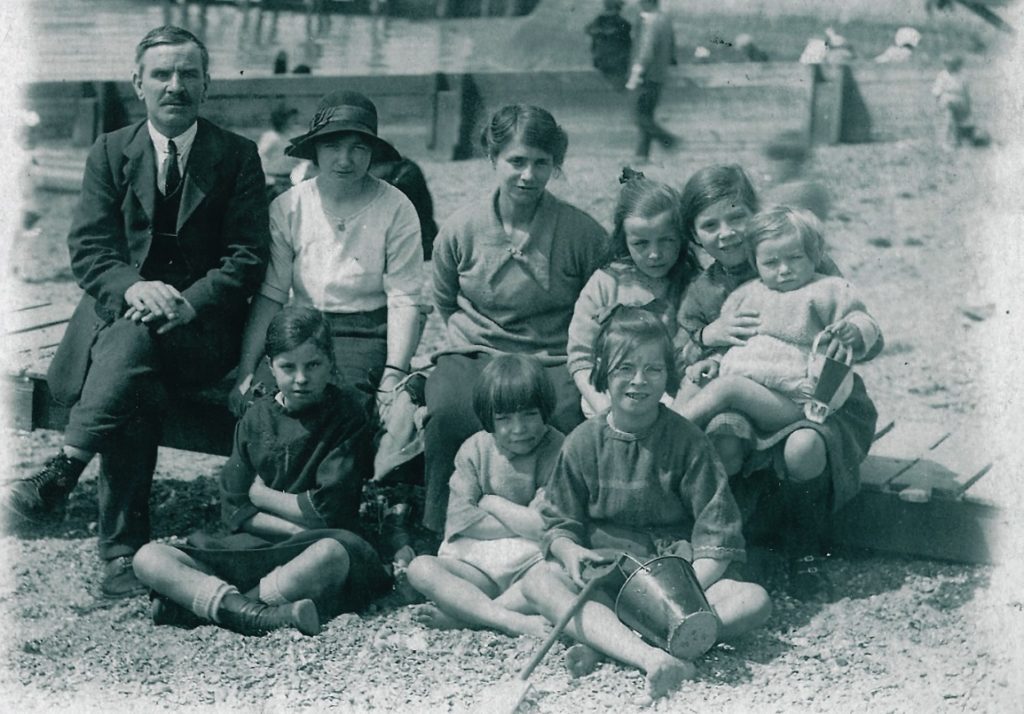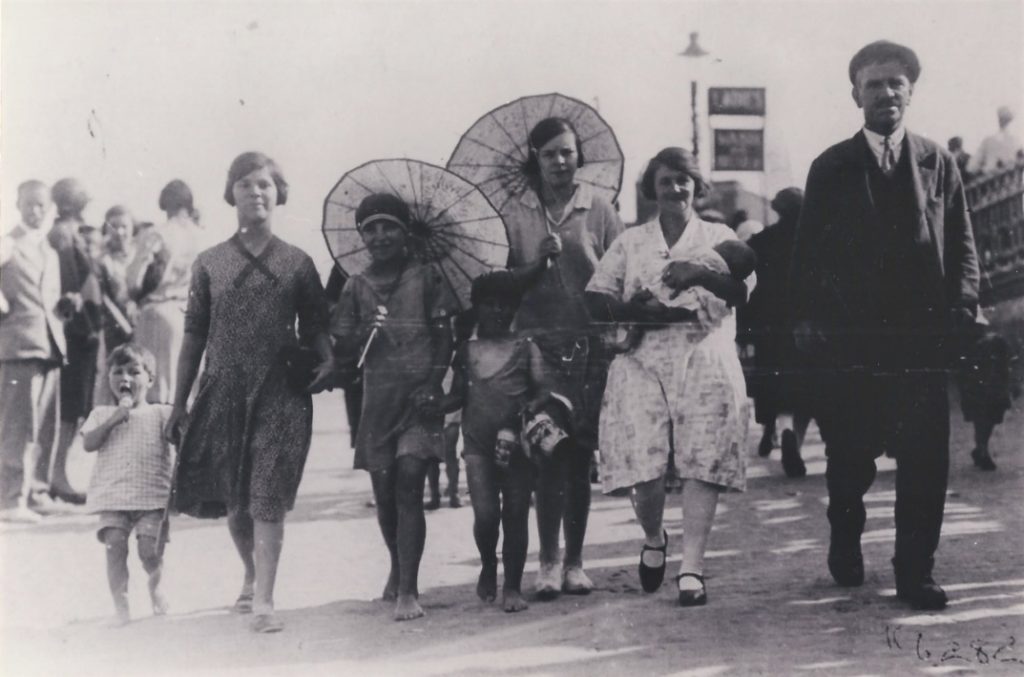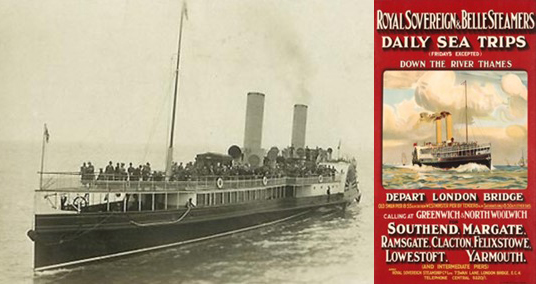Mum
My mother was born in the Richmond area of London in 1913, moving with her family to Islington, and then to Finchley where they soon settled. East Finchley was then almost entirely countryside with fields going as far as Hampstead Heath, so it was a relief to my grandma to have this house at last after living in rooms.
My grandfather, Jim Trusler, served for a time in India, and then in the 1914-1918 War (known now as World War One) where he was unlucky and lost an eye. With six girls in the family, my grandparents had always hoped for a son. First there was Florence, then Ethel, then my mother Elsie, followed by Rosie, Maisie and Ada. My mum’s aunt Louie (my grandma’s sister known as Aunt Lou) lived just down the road at Manor Park.
During my mum’s childhood, she lost two sisters. Ethel died at sixteen with TB and was buried at the Holy Trinity Church in Church Lane, East Finchley; later me and my sister Barbara were to be christened there. Rosie was eight years old when she died of Scarlet Fever, in the Fever Hospital on the North Circular Road, opposite Coppetts Wood in Friern Barnet.
Life was not easy for the Truslers, but my grandma looked after her family very well. The children were all members of Sunbeams, the junior part of the Salvation Army, and when Rosie was buried the whole of the Sunbeam group turned out, as well as most of the street. Mum said that it was a very sad day.
Grandma did all the washing in the old scullery using a copper—a tub surrounded by concrete with a hole underneath to burn coal and bring the water to a boil. The white clothes, sheets and towels were pushed around with a copper stick as they boiled, after which they would be rinsed several times in the sink, then folded and squeezed through the enormous mangle outside in the yard by the back door. During cold weather, or when it was too wet to dry outside, the washing would be hung up on lines in the kitchen and draped around the fire on a clothes horse.
There were no vacuum cleaners, so most of the cleaning was done with brooms, mops and by scrubbing on hands and knees. There were no wall-to-wall carpets, usually just linoleum (lino) floor covering and rugs. Plenty of floor polish was applied to the lino and rubbed with a duster until it shone.
From the large kitchen, French windows overlooked the yard at the back. Inside was a black leaded range, which was a heavy iron oven with a fire at the side stoked with coal. Bread and cakes would be cooked in the oven, and with the kettle settled on the hob, it would be boiled when the lid over the fire was lifted off.
Over the range was a high shelf called a mantel shelf, usually with a fringed cloth draped around it, and on top stood a clock and various ornaments. Grandma always had a canary in a cage by the window and a dresser with cups, saucers and plates on it along the same wall. There was a large table surrounded by chairs and two old easy chairs by the fireplace. My mum and her sisters and later two young brothers, spent most of their time in the kitchen as it was cold in those days.
On Sundays and holidays a front room with a well-worn settee and two arm chairs was used. There was a mirror over the fireplace surrounded by a brass fender and pictures on the walls. At Christmas time everyone helped to decorate the front room and laid a fire in the grate ready for after dinner on Christmas Day.
Mum doesn’t remember much about being small, but the early years at Hamilton Road do come back to her a lot. Grandma would be strict with them: no messing about at bed time and at meal times and up to bed as soon as Father said. Often the bedroom would be freezing cold (no central heating then) with a bath in front of the fire with Grandma scrubbing away behind your ears and making sure they were clean. Then there was cocoa with bread and dripping before bed.
There were hardly any cars then, mostly horses and carts. The children would play in the street sitting in street doorways if it was raining, playing dressing up or ball games by the Convent wall, or swinging on a rope from lamp posts. Sometimes they would walk down to Manor Park Road and watch the trains thundering over the subway, which, back then were steam trains, later to be electrified as part of the London Underground system in 1939.
Mum and her sisters, and later on, her two brothers, went to school in Long Lane, just a short walk from their home. During the summer holidays, their parents would take them to the fair on Hampstead Heath or they would take a picnic to the nearby fields.
Then there were special occasions when Grandad and Grandma would take them on holiday,[6][7] such as the time they went to Margate on the Royal Sovereign steamer[8] boat which they boarded at Tower Pier on the River Thames. Mum said how exciting it was and how they were allowed to go down below and see the ships engines. Each girl had a straw hat to wear for their holidays. Mum, her older sister and my grandma would sit late on in the evening before they departed, trimming their hats with artificial roses and ribbons.
For several years they travelled to Southend-on-Sea where they enjoyed a holiday at a quiet house, where the landlady was always pleased to see them. Grandad would make them take off their shoes when it was time to come in as not to make a noise. In the morning they would all peep through the banisters to see the breakfast table laid with bread, butter and egg cups ready for the boiled eggs. Yes, there were some good times.
My grandfather had an allotment—a piece of land which was rented out locally to the public for growing vegetables and flowers. Mum, not minding the blisters on her fingers, loved to go and help him with the digging. ‘You ought to have been a boy,’ he’d say, not knowing that later he would have two sons.
If Grandma had to go shopping and leave the others to Mum’s care, she would promise to bring back some cream cakes… providing Mum had helped her do the cleaning and kept the other children in order.
Another job Mum had was to go and help at Dors Butcher Shop next door. Mr and Mrs Dors had two girls, one of them called Elma, a friend of my mum’s during the time when they were young, but she became a bit stuck up later on in life, as Mum would like to point out. Mum’s jobs involved scrubbing the floor and cleaning the shelves. Mr Dors would often give them some fat for the dripping or extra sausages every now and then.
One time there was some trouble when a rat’s nest was found at the back of the shop under an old tank. The butcher had decided to employ a young boy called Clifford, and when the girls were once getting a picnic ready in the garden he threw some old mouldy sausages and meat bones over the wall… and and not only that! He was always calling them names.
My Aunty Florrie, Mum’s older sister, was very religious. She would attend most of the church meetings and took small children for Sunday School lessons. Auntie Maisie (May as she was also known) and Mum, on the other hand, were not so bothered about church, had quite a lot of friends and went out more. One day when Mum was talking at the front door to a friend, Florrie slammed the front door, trapping Mum’s finger and almost taking the tip off. Afterwards Florrie was shocked at what she had done, but still insisted that she was fed up with girls knocking at the door. Florrie did not like looking after the smaller girls and had a row with her father when she found out a new baby was on the way.
‘I am not helping out!’ she stormed.
The new baby was the son they had longed for and was christened Harold. Mum didn’t mind. She loved babies and loved caring for them.




Leave a Reply